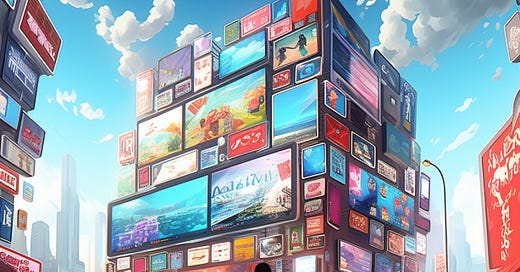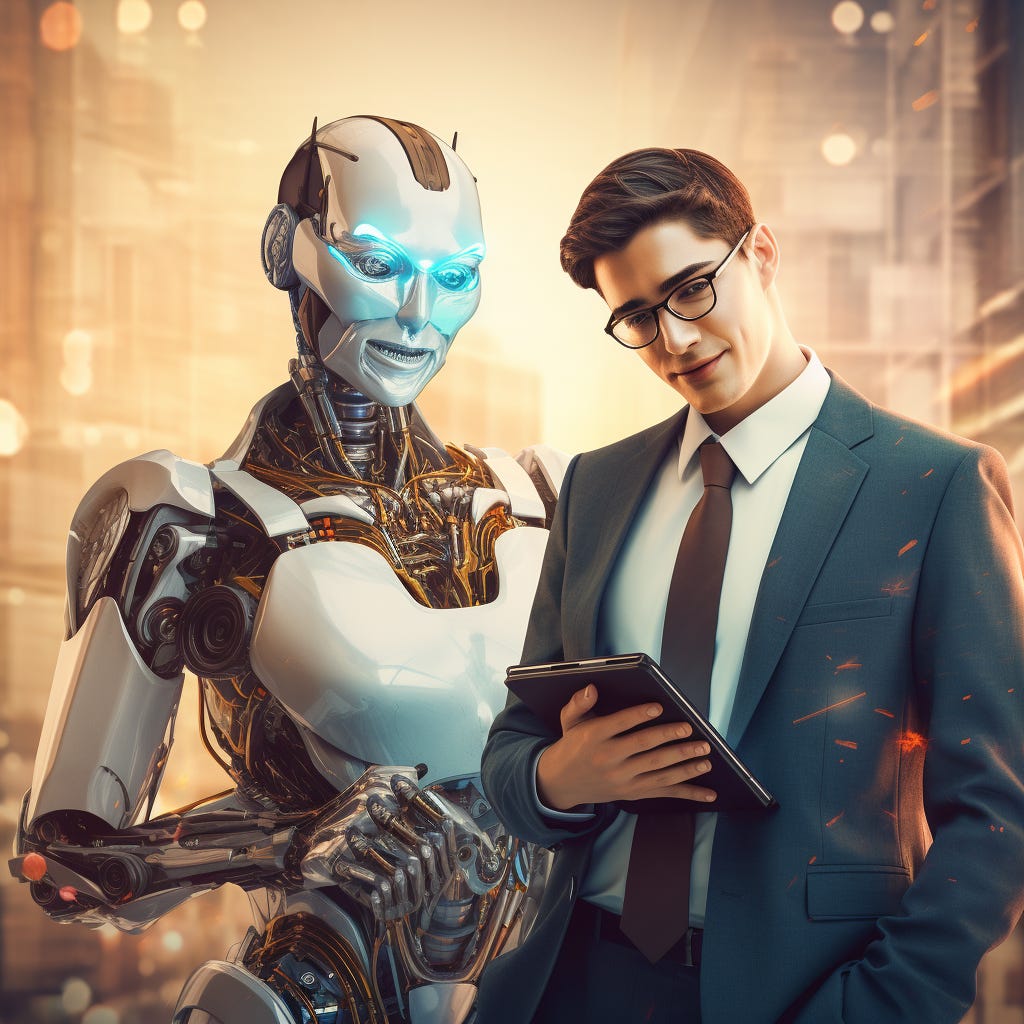AI vs. Humans: Who Will Rule Marketing?
It is becoming increasingly apparent that we’re entering a new era of marketing where briefs can be written and then corresponding campaigns can be automatically segmented, designed, and deployed in the blink of an eye. As this happens, we're left to ponder: Will the campaigns become more creative and better performing, or just more mechanized?
With more generative AI technologies being deeply integrated into marketing platforms from the likes of Salesforce, Intuit, Adobe, Google and Microsoft this isn't a hypothetical future—it's our reality of today. Note that within the past two months, all of these companies have revealed how they’re automating marketing through the integration of Generative AI into their marketing platforms.
But let's not be naive; this seismic shift isn't merely a technological feat, it's an existential turning point for marketers choosing to embrace this new terrain. Five moments made me reflect on how quickly so much in the world of AI was changing.
1. DraftKings' Misstep: How AI Could Have Helped
Earlier this week, DraftKings launched a promotion that leveraged the 9/11 anniversary to promote online betting on New York sports teams. The company quickly apologized after their "Never Forget" campaign ignited significant online backlash as it rightly should have.
I consulted GPT-4 about the wisdom of running such a promotion. The in-depth reply outlined several reasons why the campaign was ill-advised, touching on its exploitative tone, inappropriate content, potential to offend, contextual insensitivity, and the risk of negative PR. A simple query to an AI tool could have alerted DraftKings' marketing team to the pitfalls of this approach. At the very least, running the campaign concept by an AI tool should have been a part of the approval process.
Additionally, when I requested alternative campaign ideas from GPT-4 that would better resonate with both their audience and the current cultural climate, I received some remarkable suggestions.
2. AI vs. MBA: Guess Who Wins in Idea Generation?
If you believe that artificial intelligence can help with tactical, simple tasks but may never replace the ingenuity, creativity, intuition and foresight that us human beings have, then take a look at this example. Two Wharton professors, Karl Ulrich and his colleague, Christian Terwiesch involved their MBA students and an AI engine in an experiment to learn who could come up with better business ideas. Both groups (the 200 MBA students and the AI engine) were assigned to "Generate an idea for a new product or service that could be offered to college students for under $50." In a single hour, the AI engine produced an additional 200 ideas.
To assess the strength of the ideas, the professors subjected both sets to an online purchase intent survey. The results were telling: 47% of respondents favored the AI-generated concepts, compared to 40% for those proposed by the students. Read the research paper for more details. This raises an intriguing question: Who among us is truly immune to being outperformed by AI, and how can we best address this challenge? We'll delve into this further later in the article
3. Studies on AI's Threat to White-Collar Jobs
Think AI is just going to replace basic jobs? You might want to reconsider. According to a Pew study, about 22% of all U.S. jobs are at risk, particularly jobs that require a college degree. It's not just manual labor; white-collar jobs are in the hot seat too. Another recent Gallup poll amplifies this anxiety: 22% of Americans are concerned that technology will make their jobs obsolete, a jump from 14% just a year ago before the advent of advanced AI like ChatGPT. This uptick in concern is primarily driven by college-educated, younger workers aged 18-34.
In the marketing world, it's not just the 'creative types' who should be concerned. AI will shape up to redefine how entire marketing departments—and even whole companies—operate. We might need fewer human minds, not just for everyday tasks but also for jobs requiring high creativity and analytics. But it's not all doom and gloom. AI could also ramp up how much we can get done, hopefully balancing out the recent trend of 'quiet quitting' among employees. Best-case scenario? We're on the brink of a new era of efficiency and innovation.
4. Can Regulation Help Marketers Navigate AI?
This week in Washington, Congress held a private meeting featuring AI industry leaders like Mark Zuckerberg, Sundar Pichai, Sam Altman and Elon Musk, as well as union and advocacy group representatives. The Kennedy Caucus Room served as the backdrop, a venue previously used for landmark hearings like those on the Titanic and Watergate. The agenda? Discussing the urgent need for AI regulation in the United States, a sector desperately in need of oversight in my opinion.
The early consensus is promising. All parties agreed that unchecked AI is a non-starter and that bipartisan subcommittees should promptly work on crafting sensible regulation. Business leaders pushed for guardrails, social advocates raised red flags about AI bias and discrimination while union representatives discussed job displacement. The vibe was encouraging; and yes, the government might actually serve as a constructive referee in the AI arena without stifling innovation.
For marketers, this political momentum offers crucial insights. Adapting to an AI-integrated future is non-negotiable. As new regulations begin to take shape, businesses must instill a culture that values continuous learning. Up-skilling and re-skilling should become standard practice, not just buzzwords. Teams need to pivot from fearing AI's impact to embracing its potential, especially as oversight aims to curb unethical applications. Learning how to collaborate with AI, under the new regulatory frameworks, might just be the defining challenge—and opportunity—of this era for marketers.
5. Could AI Enhance Agency Work for Brands?
I was amused to see how Dentsu recently made headlines in the trade press for its innovative AI tool that gives feedback on creative work through the client personas of a "Ruthless Critic," "Idealistic Dreamer," and "Confused Creative." Simply upload a brand design, UI design, or TV script, and get feedback from all three. According to Ad Age, the initial results are intentionally more amusing than actionable, but that could change in the future. Meanwhile, Dentsu also released an AI Paid Search tool that helps with paid search ad copy development and execution.
Taking these concepts a step further, imagine an AI engine that not only reviews but also guides all creative work for a marketer and then creates paid search ad copy off of those concepts, serving as the go-between for agencies and in-house teams. While this may seem like a futuristic idea today, it could soon be a reality. As a marketer, why not use an AI tool with a limitless memory to vet agency-produced creative before it lands on your desk? This might initially sound controversial, but just like calculators once did in classrooms, it may soon become the norm.
The deeper question to consider is this: If AI starts handling parts of your responsibilities, what will that free you up to do? Will you focus on other aspects of your job, or perhaps enjoy leaving the office a bit earlier?
The Double-Edged Sword of AI in Marketing
The advent of Generative AI in marketing is both thrilling and unsettling. On one hand, AI offers unprecedented efficiency and even outperforms humans in idea generation. On the other, it raises serious questions about job security and the future of human ingenuity in the field.
For marketers, the key to navigating this complex landscape is adaptability. As regulatory frameworks begin to take shape, it's crucial to embrace continuous learning and ethical practices. The goal should not be to compete with AI, but to find ways to collaborate effectively, thereby unlocking new avenues for creativity and innovation.
In essence, the future of marketing lies not in choosing between human and machine, but in merging the best of both worlds. By doing so, we can turn what could be an existential crisis into a transformative opportunity for our own careers and our lives.






